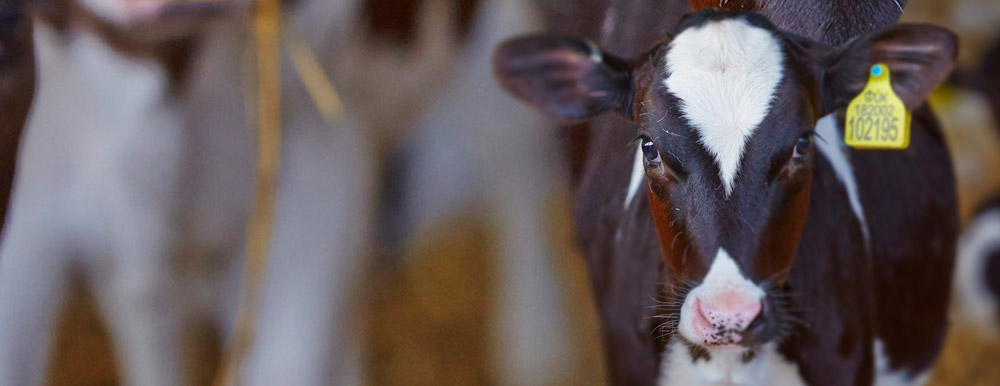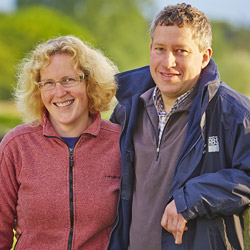
Suppliers
All of our products are locally sourced, and as a family-run firm we are pleased to support independent producers too.

Richard & Dawn Corlett, Home Farm, Ormskirk
Where does milk come from? We all know it's made by cows, but do you know the process that goes into getting it on to your kitchen table in a bottle?
Richard and Dawn Corlett of Home Farm, Ormskirk are up early - around 5:30am, in fact - to check on their dairy herd and any newly born calves.
Calves can be born at any time of year on Home Farm, whereas other farmers limit new births in their herd to springtime, and some allow a second breeding period in the autumn.
Once the babies have been checked on, the waiting 200-strong herd of Holsteins are taken eagerly to the milking station, where a feast of meal biscuits awaits.
Two hours later, milking is done and Richard and Jeff can clean everything down, ready for the second round to come at teatime.
It's back to the house by 8am for breakfast, which Richard spends with Dawn and the children before she takes them to school.
By 9am it's back to work - cleaning the cow sheds, feeding the hungry herd and again checking on any new calves, which are tagged with a unique number that is also submitted on official paperwork.
A bit of everyday farm maintenance, checking fences are secure, checking the grazing grass for the herd, and perhaps fixing up the tractor when it runs into a fault (thanks to mechanics lessons at agricultural college!), and it's time for visitors.
This might be the feed consultant from Carhils, for example, who analyses the soil and grass so Richard knows which vitamins will need to be added as supplements to keep his herd healthy.
All of this is done before lunch, and then Richard can order more feed, collect straw from another local farm, and catch up on correspondence.
Dawn, meanwhile, is not only a busy full-time mum, but looks after much of the paperwork for Home Farm – as well as being an accountant for several local firms.
Before long it's time for the second milking of the day, so Richard heads back out to the shed, leads the herd in and attaches the milking cups to their udders.
Jeff is there again to help with the milking, and the pair clean down again until, several hours later, everything is back in its place ready for the cycle to begin again the following morning at around 6am.
Each cow has a unique sensor attached to it, so its food is mixed to its own recipe, giving it the precise blend of vitamins needed to keep it in good health.
And Richard is kept fit too, with one last walk around the farm before heading home for a family dinner at about 6pm.
The early start is rewarded with some proper family time in the evenings - and the chance for him and Dawn to decide how they think the day went, and plan ahead for tomorrow.

Paul Lang, Langs Farm Gate Eggs, Ormskirk
It's not just milk that comes from Ormskirk; Lang Farm Gate Eggs opened in 1954 and current owner Paul Lang took over after many years working alongside his father.
His experience actually goes back to the age of six, when he started helping to look after the chicks, and Paul is still passionate about his birds, and about the quality of his produce.
This passion appeared at an early age, when he planted a plot of land at the back of the farm and was soon selling his own seasonal vegetables on the local market.
Nowadays there's not so much empty land to plant on, thanks to three purpose-built sheds for his egg-laying hens to live in, complete with state-of-the-art feeding systems to ensure a good quality of life, and the best quality of egg.
Paul is now lucky enough to have his pick of the chicks from the top breeders in the local area, bringing them to his farm at just over 15 weeks old, ready to start laying from 23 weeks onwards.
It's not a one-man job though, so Paul has some help from a dedicated team - and has kept the family line going, with his son William working on the packing station.
Manager Carl takes the deliveries across the Merseyside and Lancashire region each morning, returning to Lang Farm in time to prepare the following day's orders.
Working on a farm isn't easy, and keeps Paul and William busy seven days a week, but this means the birds are always happy and healthy, and there's always chance to plan ahead on paperwork and maintain the machinery that grades and packs the eggs.
Mortons have worked with Lang Farm Gate Eggs for several years, and it's an ideal collaboration for both companies, bringing together the best of the local supply chain from each new hatchling right through to your doorstep delivery.
It's a commitment to quality that is shared by Mortons and by Paul Lang, and it helps to make sure that the dairy industry in the North West is sustainable for the future too.